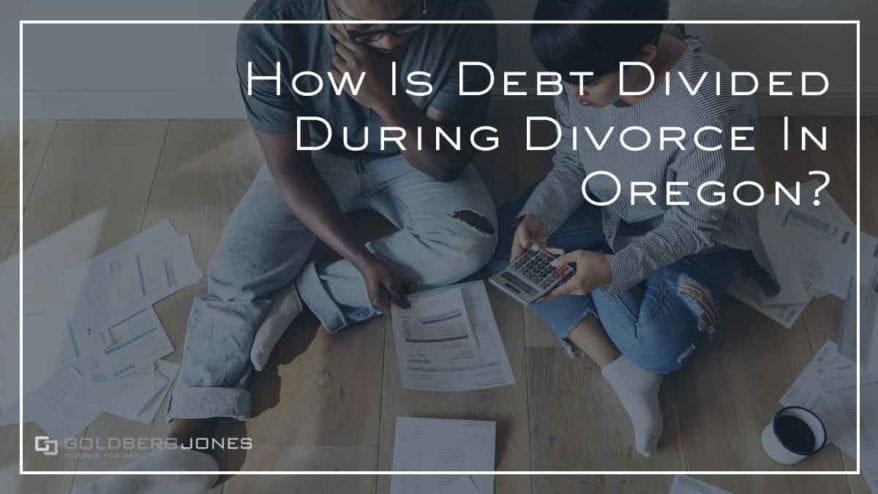In Oregon, when it comes to dividing debt in a divorce, the general idea is for both spouses to emerge on a relatively equal footing and be able to enjoy a standard of living similar to what they had during the marriage.
That’s a relatively broad statement, so let’s look into how that manifests in reality.
Dividing Debt in Divorce
When it comes to the division of debt, as well as assets, Oregon uses the equitable distribution model.
Equitable distribution is: “A legal principle under which assets and earnings acquired during marriage are divided equitably (fairly) at divorce.”
No matter the name on the title, credit card, mortgage, auto financing, or business loan, Oregon presumes both spouses contributed to the acquisition. It’s then subject to division in a fair and equitable fashion.
If you build up substantial financial liabilities during a marriage, the court also views them as shared marital obligations.
Related Reading: How Do Major Purchases Affect Divorce Proceedings?
Does Equitable Distribution Mean Debt is Split Equally?
This question comes up often and the answer is no.
It’s important to note equitable distribution does not mean you divide everything equally. Assets and debts may be divided disproportionately depending on the unique factors of your case.
You may wind up with a 40/60 split, but it’s also possible the court will determine a 50/50 division is fair.
Ultimately, the debt division decision accounts for need, earning potential, and other factors. Exceptions to this include things like gifts or inheritances.
Related Reading: How Is Property Divided?
Dividing Debt Acquired During Marriage
Types of debt acquired during marriage include credit card balances, mortgages, auto financing, business loans, and things of that nature then get distributed between spouses.
No matter the name on the contract, Oregon presumes both spouses played a part in building that balance. Dividing debt in divorce is then subject to division in an equitable fashion.
Pre-Marital Debt
While you will likely find yourself on the hook for the debt your ex built up during the marriage, there’s good news when it comes to the pre-existing variety. Timing, however, is the key in this situation.
If your ex rang up thousands of dollars worth of student loans before you tied the knot, that’s not your problem. The same goes for those massive credit card bills that still pop up.
Debt Accrued During A Legal Separation
For debt following a separation, but before a divorce is finalized, the waters muddy a bit.
If the court looks at necessities like electric bills and utilities, they may split them up.
However, if your ex goes on a lavish ski vacation, that’s a different story altogether.
Unexpected Debt
If you buy a house or condo, finance a boat, or secure a car loan, you expect to deal with these debts. But what about unexpected surprises? What if your spouse acquired debt without your knowledge? How is that debt divided in a divorce?
Again, from a legal point of view, the court doesn’t generally care whose name appears on the paperwork.
If your ex obtains a credit card behind your back, runs up an astronomical bill, it will still likely be a joint obligation. Generally speaking, if it’s amassed during your marriage, you have to deal with it. At least in part.
As with most areas of divorce, dealing with debt gets twisted in a hurry. In the case of shorter marriages, things may be straightforward, but the longer a union, the more intertwined lives become, and the more complex matters get.
Financial Agreements
Do creditors have to abide by the divorce decree? No. And this fact can have a serious impact.
So, you go through the process and divide all of your shared debts. Say the court gives your ex a car that you financed as a couple, as well as the monthly payment. If your ex fails to make those payments, it may come back on you.
If your name remains on a home loan, credit card bill, car loan, or similar contracts, you remain liable for those debts. Even if the divorce agreement gives them to your ex.
Family courts have no jurisdiction to alter agreements with creditors, those stay in place. The divorce settlement can delegate debt and decree that your ex must pay back a balance. But that doesn’t take your name off the paperwork.
Part of the divorce decree can include stipulations like your ex has to refinance a home loan within a certain amount of time to remove your name. Still, that doesn’t always happen.
It’s important to stay on top of things like that to make sure nothing comes back to bite you. This can impact your credit, among other things. If creditors come after you, you may wind up having to pay off the debt and then sue your ex for restitution.
Related Reading: How is a Business Divided During A Divorce? Can You Protect It?
